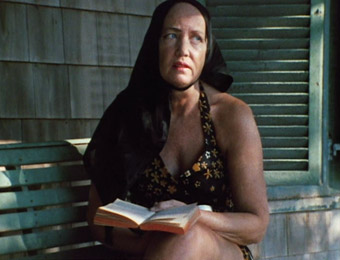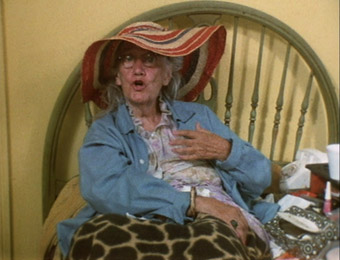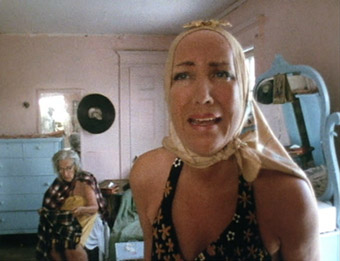|
Here's
a phrase for you, a sweeping generalisation but with truth
at its core:
We
all judge by appearances.
You
may not believe this applies to you, that you never form
an opinion based on how a person looks or behaves. And bless
you if that's true, as you are, I would venture, a genuinely rare
creature. (Bit of advice, though, if someone runs towards
you screaming angrily and brandishing a knife, I'd get judgemental
real quick – it might just save your life.) Even if you
do not make actual decisions based on first impressions,
I'll wager that deep down, in that bit you keep hidden from
public view, you still have a momentary flash that attempts
to read something about those you meet, whether it be based
on expectations, experience, social conditioning or even
snobbery, either inverted or the regular sort. I'm no different.
I'll shake hands with anyone, but still get a twinge when
introduced to anyone wearing a grey suit and a
smile.
When
Grey Gardens was released back in 1976
it ran foul of such attitudes, and if a few of the
comments I've encountered on-line are anything to go by
it continues to do so. Made by two of the pioneers of Direct
Cinema, Albert and David Maysles (who here share the directing
credit with editors Ellen Hovde and Muffie Meyer), the film
takes us into the world of a mother and daughter who share
the name Edith Beale and are known respectively as Big Edie and
Little Edie. Both women were former members of New York's
high society scene and Little Edie – full name Edith Bouvier
Beale – was a first cousin of Jackie Kennedy Onassis and
Lee Radziwill. Are you forming a picture of the two yet?
Surprisingly easy, isn't it.

When
first encountered by the Maysles, however, the two women
had effectively dropped out of high society and society
in general to live a reclusive life in their East Hampton
mansion house, which had become so run down that it had
been the subject of a raid by the Suffolk County Health
Department. When we meet them, Big Edie is spending a good
part of her time in bed in her unkempt bedroom, Little Edie
keeps her hair covered at all times with anything from traditional
head scarves to tied pullovers, cats roam the house and
use just about anywhere as a toilet, the garden is a jungle
that almost requires a machete to negotiate, and Edie leaves
bread out for the raccoons that live in the attic, a good
part of which the animals have destroyed. And close though the
two women obviously are, they'll argue about almost anything.
How's that picture looking now?
Some
of those reviews I mentioned earlier, the less favourable
ones, were tinged with a sense of outrage that once well-to-do
women, women directly related to the country's most popular
First Lady, could allow themselves to sink so low, and even worse that the Maysles had somehow thought them a fit subject
for a feature documentary. Charges of exploitation were
hurled from a number of quarters, notably Walter Goodman
in The New York Times and the venerable Pauline Kael, whose
review was peppered with false claims about the making of
the film (not the first time she had levelled such charges
against the Maysles, as it happens). There was the sense
that Grey Gardens was being seen as a cinematic fairground
sideshow, a voyeuristic invasion of private lives that,
because they were different to our own, were being put on
display for the paying public to gawk at.
Now
before I stumble blindly to the filmmakers' defence I should
say that this must have been a difficult call at the time,
as it always is with any documentary work that gets intimately
and perhaps uncomfortably close to its subject. As is
the way with Direct Cinema – a documentary form in which
formal interviews and narration have no place – this is an
observational piece for which only the slimmest of contexts
is provided (newspaper headlines about the health board
raids and this impending film), leaving the viewer to fill
in quite a few blanks themselves. None of which washes when talking about reviewers in Goodman or Kael's position, for whom a little
research and the odd phone call would hardly have been a
major upheaval to their daily routine. The obvious eccentricity
of both Beale women has also raised the question of how
aware they were of what they were letting themselves in
for. But both of the Beales were apparently delighted with the
finished film and Little Edie even wrote a letter to Walter
Goodman in support of it and the Maysles, but his paper
refused to publish it on the grounds that they considered
Edie to be "schizophrenic."

But
elsewhere the film was met with considerable favour and
is even regarded by some as the Maysles' masterpiece. The
frequently argumentative relationship between mother and
daughter is one that clearly touched a nerve with many of
the film's admirers, with Big Edie's sudden bursts of song
(at 79 she can still hold a tune) and Little Edie's
creative clothing, impromptu dances and whispered confidential
asides to the filmmakers having an element of camp that helped
make it one of the few documentaries to achieve midnight
movie cult status. The couple's refusal to conform to the expectations
of their social background saw them transformed into symbols of free
expression for counter-culture America, and Little Edie's
individualistic dress sense had the most unexpected effect
of making her a fashion icon in the years that followed the
film's release.
Their living conditions will still doubtless freak out those
with an obsession for tidiness and order (good thing too), but as
someone who lives and thrives in chaos in a house that is
crumbling from the inside, I immediately warmed to both
women. With no specific story to tell, any film made in
the Direct Cinema style needs one thing above all others
and that's characters who are interesting, and the Beales
are certainly that. Their conflicts may be loud – they regularly
talk over one another to get their side of stories across
to the Maysles – but their pains and insecurities are really no different to those that afflict any one of us.
Little Edie in particular appears to have walked willingly
into a trap whose jaws she is all too comfortable with,
despite her protestations and seemingly desperate need to
return to the bustle of the city. Repeatedly she confides
to or performs for the camera away from her mother, only
to be summoned by shouts that echo through
the house, calls she always responds to and only once under
any sort of protest. Her bond to her mother is clearly evident
beneath the arguments – late in the film she explodes with
anguish at the lack of men in her life and lays the blame
squarely at her mother's door, but reacts very negatively
to the moving in of young handyman Jack (whose relationship
with the women is never clearly defined) and
her mother's fondness for him, clearly resenting this funneling
off of even part of Big Edie's attention.
There
seems little doubt that both women, who willingly expose
aspects of their lives that most would want to keep
hidden, are performing for the camera to some degree (they
are, after all, both faded performers themselves), but it
is clearly in their nature to do so and does not detract
from the truth that lies at the heart of all the Maysles'
work. The interaction between the the filmmakers
and their subjects is very much part of this, an openness about a relationship
that is usually kept hidden, but one that has been there since the
early days of Direct Cinema and evident in such key genre works
as Wolf Koenig and Roman Kroitor's Lonely Boy
(1962) and Stravinsky (1965). This interaction
has been identified by some as one of the things that distinguishes
Direct Cinema from Cinéma Vérité, the
latter a label that is often applied to the Maysles' work that they
themselves do not use.

Grey
Gardens is an enthralling and fascinating film,
but it will be down to personal taste whether it really
does rank as the Maysles' masterpiece. For myself I'll still
go with Salesman
(1968) and Gimme Shelter (1970), but only
by a nose. I came to Grey Gardens later
than those other two films and have yet to get as many viewings
of it under my belt or see the recent follow-up film, The
Beales of Grey Gardens, which was assembled from
footage not used here. And despite a lack of cats and badgers
(I'm not a big animal lover), I've already taken to referring
to my house, with its crumbling plaster, overload of unorganised
papers, rampant garden growth and untidy piles of review
discs, by the name of the house located at 3 West End Avenue
in East Hampton, New York, and the one that gives this film
it's title.
The
correctly framed 4:3 transfer here appears to have been
sourced, as with the Masters of Cinema release of Salesman,
from the US Criterion release, hence the decision to release
an NTSC rather than PAL disc to avoid any standards conversion
issues. Shot on what looks like high speed 35mm stock, the
grain is very evident throughout, but this is very much
part of the Direct Cinema aesthetic and not a problem. Colours
are true to life within lighting and film stock restrictions,
and contrast and black levels are very good.
The
Dolby mono 1.0 sound is as clear as the location recording
difficulties will allow, with only the odd mumbled or whispered
line requiring a rewind or activation of the subtitle track,
which again has been adapted from the Criterion disc but
painstakingly anglicised for this UK release.
Albert
on Grey Gardens (30:57)
An interview with Albert Maysles conducted at his studio
by Mark Rance and Craig Keller, recorded at the same session,
I would imagine, as the one on Masters of Cinema's Salesman DVD. As with that interview, the camerawork is a bit wobbly
in places and a few of the golden rules are completely ignored
(shooting your subject against a window so that he goes
into silhouette, zooming in and reframing mid sentence),
and the sound has again been boosted to make it audible,
which also brings up the background noise and still leaves
moments lost in a mumble (someone, please, buy Rance a clip
mic). But I'm prepared to forgive a lot for the content,
which is once again great stuff, covering how the project
came about, their relationship with the Beales, the criticism
of the film, the changing nature of documentary film and
more besides, all in thoroughly engaging fashion.
Jerry's
Cab (9:43)
Mentioned by Albert in the interview above, this is a small
portion of footage shot by him and Robert Leacock (son of
Vérité pioneer Richard Leacock) of Jerry,
the young handyman from the film, in the New York cab he
now drives for a living. He talks about the four years he
spent with the Beales and the film itself, including the
accusations of exploitation, which he refutes.
Past
& Present (11:20)
Albert and Lily Greenfield-Sanders take Jerry back to Grey
Gardens, where he wanders the grounds and affectionately
recalls the time he spent there.
Theatrical
Trailer (2:14)
A commentary-free trailer that mixes extracts with positive
quotes.
TV
Trailer (0:37)
This one does have a voice-over.
Grey
Gardens is a rare example of a documentary that has achieved
genuine cult status, and the appearance of this DVD version
couldn't be better timed. Along with the release of the
above-mentioned The Beales of Grey Gardens
(available in the US from Criterion as a well priced stand-alone
or a double pack with this film), last year this film became
the basis for a stage musical by Doug Wright, Scott Frankel
and Michael Korie. Later this year we can expect to see
the feature film adaptation, written and directed by Michael
Sucsy and starring Drew Barrymore and Jessica Lange as Little
Edie and Big Edie respectively. And I couldn't help wondering
if the decaying mansion setting was at least a small influence
on Gus Van Sant's haunting Last
Days.
Once again I can't help but mourn the absence of the excellent
commentary found on the Criterion disc, this one by Albert
Maysles and editors Susan Froemke, Ellen Hovde and Muffie
Meyer, plus a couple of useful interviews (including one
with Little Edie done for Interview magazine in 1976). But
the Masters of Cinema disc has some nice extras of its own,
and if you can live without the commentary then this is
a very worthwhile purchase and a must-see for documentary
fans and true outsiders everywhere.
|